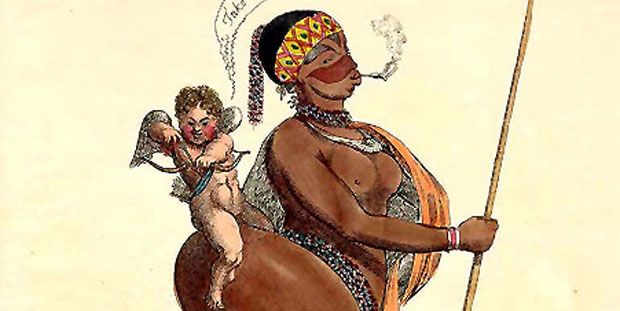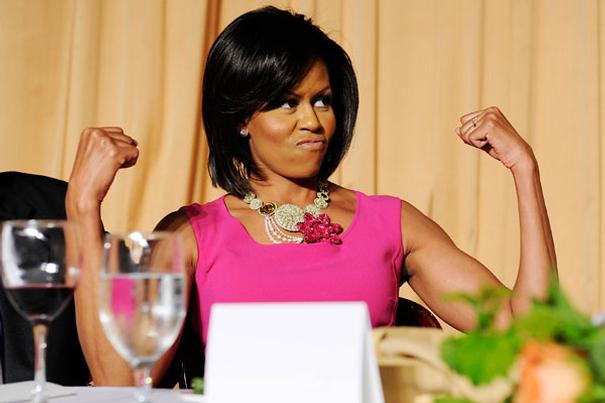I was thirteen and a freshman in high school when I got my first boyfriend. I didn't know anything about dating or relationships. It wasn't "serious" although I thought it was at the time. He would walk me to class. I'd watch him perform. We'd sit in the hallway giggling and holding hands. I even shared my first kiss with him.
Then we broke up. And one of the ways he used to get back at me was calling me a ho and a slut.
Later, I distinctly remember being taken aside by an older Black woman. She explained to me that I was called a slut because that's what men do when they're angry. And I could have avoided it if I had never been alone with him in the first place because once you do anything with a man he will expect you to have sex with him and if you don't he will begrudge you for it.
That's because boys will be boys. And it's because you are a (Black) girl.
That was my introduction to the politics surrounding the Jezebel image.
Tuesday, February 25, 2014
Stopping Jezebel: Some Thoughts on the Complexities of Black Women Owning their Sexuality
Black Tokenism & The PWI Experience
Most Black folks have experienced being the token at some point in their life. Especially if they are accustomed to inhabiting majority white spaces.
Predominantly White Institutions (PWI's) in particular are notorious for forcing the token identity on unsuspecting Black college students.
Being the token can be intimidating if you're shy and like to keep to yourself. It's a way of highlighting you for no other reason other than the fact that you're the only Black person in the vicinity. So now it is you who must speak on behalf of your race. It is you who must know everything about Black issues and hold all of the answers. Your classmates and even your professors will be looking to you.
This is a very common phenomenon that Black people, to a certain extent, have come to expect. But the emotional and psychological costs of tokenism are not often considered.
As I prepare to finish college, I am now more aware of all of the ways tokenism has been a detriment.
Monday, February 24, 2014
Not Your Strong Black Woman Anymore
Strong Black Woman enthusiasts aren't always obvious. Sometimes it is covert. But they reveal themselves by never believing that you are tired or sad or might need assistance. Or believing that you have everything under control at all times. They are the people who say there are "no excuses" and that includes being physically ill, depressed, overwhelmed, or just not in the mood to be busy.
It is a given that Black women will be treated like this by people who are not Black women. But oftentimes we treat each other in this manner as well. To me this has been the most hurtful because you can easily expect to be treated like a mule or an impervious superwoman by outsiders, but it is easy to expect compassion from one's own.
Friday, February 21, 2014
Black Feminist! Are you Black first? Or are you a Woman first?
Are you Black first? Or are you a woman first?
I get this question all the time because I am a Black feminist. People want to know if this means that I care less about the political realities of being Black. If I am now only concerned with being a woman. Or do I allow my blackness to get in the way of caring about issues impacting women.
Wednesday, February 19, 2014
Let's Talk About Colorism (Beyond What Men Think & My Self Esteem)
Colorism.
Occasionally, the topic takes center stage in Black discourse. Usually spurred by a documentary or TV show. Recently, we've had the Dark Girls documentary and Oprah's Lifeclass. I've watched both of these shows. Both seem to be centered on how horrible it is to be dark and ugly and unwanted by men (these three things always go together!) and how dark Black girls just need to get over it and find her self esteem in spite of this.
Love yourself, girl! Then maybe others will love you and if they don't? Who cares!
Occasionally, the topic takes center stage in Black discourse. Usually spurred by a documentary or TV show. Recently, we've had the Dark Girls documentary and Oprah's Lifeclass. I've watched both of these shows. Both seem to be centered on how horrible it is to be dark and ugly and unwanted by men (these three things always go together!) and how dark Black girls just need to get over it and find her self esteem in spite of this.
Love yourself, girl! Then maybe others will love you and if they don't? Who cares!
The Good Black Girl Complex
 I remember the first time I was praised for being a virgin. It was in comparison to another Black girl. The boy in question said I was actual "girlfriend material" because of my virginity. He didn't mention any other characteristics. Just that. And he compared me to another girl who didn't have that quality.
I remember the first time I was praised for being a virgin. It was in comparison to another Black girl. The boy in question said I was actual "girlfriend material" because of my virginity. He didn't mention any other characteristics. Just that. And he compared me to another girl who didn't have that quality.Even "pre-Black feminist" me knew there was something wrong. But I didn't have the sociological or feminist jargon to explain what was wrong to myself. And besides, like most people I enjoy attention that seems to be in my favor. I might guiltily enjoy it if it's at the expense of others but I'd be lying if I said that "pre-Black feminist" me found what the boy said insulting.
This moment was poignant. I remember the confusion of being praised for something that I had never considered to be important or consequential. I remember feeling happy that he liked me but disappointed that he compared me to somebody else. It seemed like less of a compliment.
Women learn from girlhood to take arbitrary characteristics, that don't in fact mean anything substantial or make them a better person, and believe that these things make them "good." There's so many messages floating around about how to be a "good" Black girl. And the fact that many of these messages are contradictory doesn't stop many Black girls from trying to fulfill them.
Thursday, February 13, 2014
Nicki Minaj's "Looking Ass Niggas" & the Conundrum of Feminist Politics
[Trigger Warning for Discussion About Sexual Assault and Rape.]
I am a very huge fan of Nicki Minaj. Every time she releases a new video I am sure to watch it. So naturally, I found myself watching her new release "Looking Ass Niggas." Before the video release, fans were teased by stills from the shoot. Nicki seemed to have drastically changed her aesthetic for this video. She was a lot more "natural" than she normally is and seemed to be going away from her traditional Barbie look.
This excited many of her fans who have never fully embraced her Barbie image. Although I personally like her no matter what persona she sports. To me that is one of the strengths of Nicki Minaj. She is versatile. And she is creative. She captures attention. Another one of her strengths is that she has unapologetically spoken up in favor of women. But maybe not always in the best way.
Monday, February 10, 2014
The Paradox of Assertiveness for Black Women
Last summer, I attended a college women's leadership conference. Everyone was high on Sheryl Sandberg's book Lean In and I listened to a keynote speaker who talked about how women are socialized to be meek and quiet in comparison to men.
And then after her speech was over she for some reason felt compelled to mention that Black women are the exception because our culture encourages us to be assertive and in charge.
The "assertive" and "angry" in control and independent Black woman is a myth. It was disappointing to hear a well-known (white) feminist act as if this stereotype is factual and uphold it in front of hundreds of people.
Black women deal with the paradox of assertiveness. In order to be respected as a human being we all need to assert ourselves. We need to let others know how we want to be treated and given the space to control the direction of our own lives. Because assertiveness is a derisive label plastered on Black womanhood it necessitates that Black women give up these basic human necessities in an attempt to avoid further mockery.
Wednesday, February 5, 2014
Black Feminism and Everyday Living
"Academic women and men engaged in the production of feminist theory must be responsible for setting up ways to disseminate feminist thought that not only transcend the boundaries of the university setting, but that of the printed page as well. It is also our responsibility to promote and encourage the development of feminist theory by folks who are not academics."
- bell hooks Talking Back: Thinking Feminist, Thinking Black
I have self-identified as a Black feminist since I was eighteen years old. It was the summer after my first year of college. My racial consciousness skyrocketed my first year of college because of numerous racial incidences. And those experiences made me open to and receptive of wider notions of social justice and anti-oppression work: something that I'm still broadening to this day.
But I will always remember reading my first bell hooks book as a monumental turning point in how I viewed myself and the world. She was the first person who gave me the words to articulate the knowledge I implicitly had: that women are treated differently than men. She taught me that Black women are treated differently than Black men. She explained my every day experiences through a sociological and historical lens. I was blown away and I knew I had to learn more.
Monday, February 3, 2014
The 77 Cents Pay Gap Statistic Harms Women of Color More Than it Helps
Unlike many feminists, I am thoroughly unimpressed by President Obama's mention of the "pay gap" in his recent State of the Union address. President Obama stated, "Today, women make up about half our workforce. But they still make 77 cents for every dollar a man earns. That is wrong, and in 2014, it's an embarrassment." On the outset, this declaration sounds progressive. But I see it as a willful ignoring of issues of pay inequality plaguing people of color.
The 77 cent statistic refers to the fact that American women on average make about 77 cents to an American man's dollar. This is a widely cited statistic. It is a statistic that has been widely disseminated by the White House previous to this most recent State of the Union address. It is a statistic cited by well respected feminist organizations. It is so widely known that it suffocates any discussion of the racial pay gap.
The 77 cent statistic refers to the fact that American women on average make about 77 cents to an American man's dollar. This is a widely cited statistic. It is a statistic that has been widely disseminated by the White House previous to this most recent State of the Union address. It is a statistic cited by well respected feminist organizations. It is so widely known that it suffocates any discussion of the racial pay gap.
Subscribe to:
Comments (Atom)









